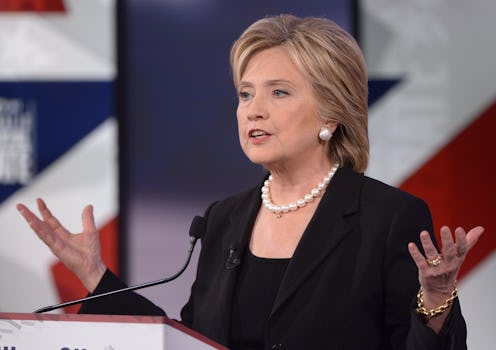News
Clinton Urges American Leadership At COP21
President Barack Obama attended COP21, the annual United Nations climate change talks, in Paris, France, this week, along with leaders from more than 180 countries. This December will mark the 25th anniversary of the talks, which have been aimed at establishing a legally-binding, worldwide agreement to reduce carbon emissions and keep the global temperature from rising no more than 2 degrees Celsius since the Industrial Revolution, according to CNN. Despite the importance of this year's climate talks, many of the presidential candidates haven't made climate change a big part of their platform. But, on Sunday, TIME published an op-ed by Democratic presidential candidate and former Secretary of State Hillary Clinton about the Paris climate talks. Clinton's strongest points in her op-ed make it clear that climate change isn't a back-burner issue for her.
Prior to writing her op-ed, Clinton came out as an opponent of the Keystone XL pipeline, admitted that climate change is man-made, and made specific policy proposals to reduce emissions in the U.S., according to NPR. Clinton waited awhile before coming out against Keystone XL, which drew criticism from fellow Democratic candidate and former Maryland Gov. Martin O'Malley. O'Malley accused Clinton of not leading on the issue and said that she was instead just taking the politically popular opinion. Well, in Clinton's op-ed, she made it clear that her ideas to combat climate change aren't just politically popular — she said they are necessary because climate change threatens the "health and future of every child."
Clinton's five strongest points in her TIME op-ed lay out a solid plan for addressing the global crisis of climate change.
Clinton began her op-ed by describing the problem that Obama faces in Congress: she said he faces Republicans who either deny climate change, say we can't do anything about it, or shut down programs and tools needed to combat it. That's why, she said, the Paris climate talks are so important. Clinton laid out a clear plan for what needs to happen at the talks, according to TIME:
In Paris this week, world leaders have the best chance in years to forge a new, durable, ambitious international climate agreement. I believe they must be guided by three principles. First, all countries must take responsibility for combating this global crisis, and put forward commitments to curb their own greenhouse gas emissions. Second, the agreement should galvanize financial assistance for, and spur private investment in, developing countries to help them adapt and achieve sustainable economic growth.
And finally, it must be an agreement that can be strengthened over time. Countries should agree to come together regularly to raise their collective ambition.
Then, Clinton pointed out that we will need development and technology to adequately address climate change. Her plans acknowledge that the longer the world waits to address climate change, the more catastrophic — and expensive — the damage will become:
Over the past year, 164 countries accounting for 90 percent of global emissions have announced national targets and measures to reduce pollution that they are ready to codify in Paris, recognizing that cutting emissions and investing in clean energy isn't just good for the planet — it's good economic sense.
Clinton said that during her time as secretary of state, she "put combating climate change on the agenda for my first trip to Beijing and kept it there over the next four years," according to her op-ed. She appointed the first high-level "special envoy" for climate change and led a push to create the Climate and Clean Air Coalition, which reduced "super pollutants." Her three specific plans to address climate change in the U.S. recognize that both renewable energy and cooperation with other developed nations will be crucial:
As President, I will protect and build on the progress President Obama has made at home. I will set ambitious goals — to see 500 million solar panels installed within four years and enough renewable electricity to power every home in America within 10 years. I'll also pursue a new North American Climate Compact, because the United States, Canada and Mexico should work together to build a clean energy future for our continent.
Clinton called out Republicans who deny climate change, saying they're on the "wrong side of science and of history," but also on the wrong side of their own voters. She said people who believe that addressing climate change means opposing economic growth are being inaccurate, but they're also trying to sweep the effects climate change will have on future generations under the rug:
We must reject the false choice between combating climate change and fostering strong economic growth. If any country can prove that, it's the United States. Under President Obama, we're leading the world in the fight against climate change. I won't let anyone to take us backward, deny our economy the benefits of harnessing a clean energy future, or force our children to endure the catastrophe that would result from unchecked climate change.
Clinton's op-ed showed that the understands that addressing climate change won't be easy and it won't be cheap, but that shouldn't be surprising. It's one of the greatest, man-made problems of this century, and people around the world are going to have to get creative to fix it:
The fight against climate change will be long. It will take the efforts of every country, every industry, and every community. It will take the leadership of every President. But at last—in Paris—the framework of a lasting solution is within reach. We must seize this moment.
The immediacy of Clinton's urging exhibited her readiness to fight climate change right now, because the world really can't wait any longer.
